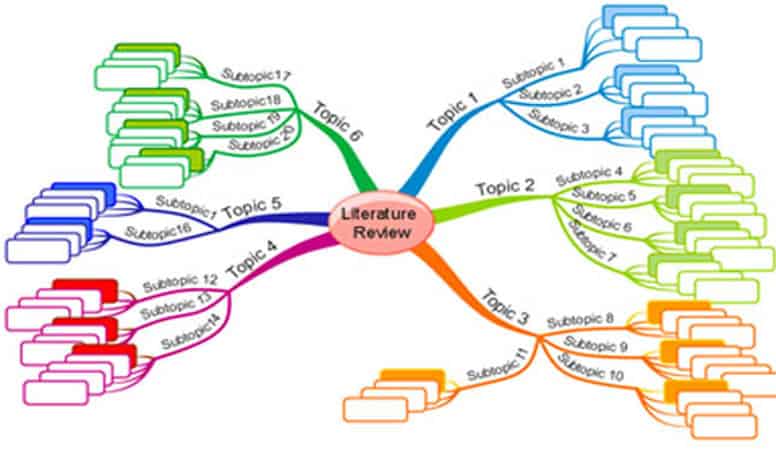A literature review is a type of review article or a scholarly article that includes the current knowledge including substantial findings, as well as theoretical and methodological contributions to a particular topic of research. It is the key step of a research process and demands a complex range of skills, such as how to define topics of exploration, acquiring skills of literature searching and retrieval, development of analyzing ability, reorganization, reshuffling of the data. It shows your plan of investigation to research the topic of your interest. The reader gets up to date information on the topic with the literature review provided. Sources covered in the review may include scholarly journal articles, books, government reports, websites, etc, providing a description, summary, evaluation of each source. The selection of sources should be clear and strategic along with a good structuring and accurate use of terminology enhancing the flow and readability of the review.
Table of Contents
TogglePurpose Of Literature Review
- The foremost purpose of the literature review is to convey the reader’s previous knowledge and facts established on a topic, along with the strengths and weaknesses.
- The literature review allows the reader to be updated with the state of research in any field and any confutations that exist with the findings of other research studies.
- It aims to improve research methodologies and the development of research investigative tools.
- It gives an insight into the problems encountered by the previous researchers, also preventing the duplication of the research.
- Simply revealing the need for additional research.
Types Of Literature Review:
Argumentative Literature Review
As the name implies, this review examines literature selectively in order to support or refute an argument, deeply imbedded assumption, or philosophical problem already established in the literature. This type of literature review is of utmost importance in the field of social sciences.
Narrative Literature Review
This type of literature review critiques the literature and summarizes the body of the literature. It draws conclusions about the topic, identifying gaps and inconsistencies in a body of knowledge. A sufficiently focused research question is required to conduct a narrative literature survey. This type of literature survey is most popular in business studies.
Theoretical Literature Review
This type of literature review reviews the theoretical literature underlying a topic. It is important as it helps to build your own ideas. Theory without research is sans any basis or justification, and research without theory would be vague and meaningless. Literally this review focuses on theories that can tell us what to look at and what data to collect, i.e. it reveals the current theories that lag behind to explain the new or emerging research problems.
Historical Literature Review
Historical Literature Review focuses on examining research through the past, or simply a period of time, starting with the maiden birth of an issue, concept, theory, phenomena that emerged in the literature gradually. It aims to identify the likely directions for future research.
Systematic Literature Review
Systematic Literature Review focuses on using systematic methods to collect secondary data, critically appraise research studies and qualitative and quantitative analysis. These reviews often find use in biomedical and health sectors and other areas where systematic reviews of existing studies would be helpful. Such reviews examine clinical tests, public health interventions, environmental interventions, social interventions, adverse effects, and economic evaluations.
Integrative Literature Review
An integrated Literature Review is a general review of existing literature as a systematic process. It involves both quantitative and qualitative studies, hence the term integrative. It is also called a systematic review by some. Its main objective is to present the phases of an integrative review and relevant aspects to be taken into account when using this methodological resource
Basic Search Strategies For Literature
To begin with start your research using targeted keywords. Break the topic you are researching into main concepts. Include the terms you plan to use in your manuscript. Use precise terms to define your concepts. Then start your research making sure all your databases are covered. Keep a record of journals you come across during your researches. This will give a knowledge of prominent journals in your field which cover your topic of interest. Use reference managers which allow you to download and save papers in your computer thus overruling the manual compilation of references thus saving time. Though you may face some technical problems initially during its usage, a video tutorial on these will be of commendable help. You can avail of the help of our experts at allassignmentsupport.com anytime. Another important point which shouldn’t be missed is keeping up with the literature. A large number of databases and publishers provide alert features for citation, keywords, and Table Of Contents. These alerts help in keeping up newly published papers and abstracts.
Reading books can also be very useful as they provide a general overview of the topic. Also, Grey literature can come to the rescue as it consists of information that is not searchable through conventional search engines. Another important thing is to keep an eye on the conference proceedings as they provide the latest findings and discussions on the topic of study giving you clues on the forthcoming papers that may be published. The scientific quality of the study you are citing should stand up to scrutiny. Also, bear in mind that not all citations are correct and the automated system can find the wrong details.
Summarizing the above a good litrature review
- We should analyze, interpret, and critically evaluate the literature.
- Should synthesize sources to highlight patterns, themes, conflicts, and Gaps.
- Should show the state of current knowledge in relation to a central research question or hypothesis.
- Should summarize the key findings taken from literature and emphasizing their significance.












1 thought on “How To Write A Literature Review”
Pingback: How To Write A Literature Review | Allassignmen...